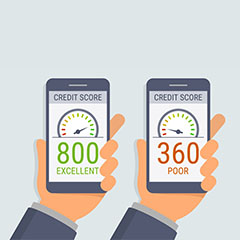It’s easy to find quick tips on how to increase credit score on your personal credit report. You won’t find as much about business credit score at all, let alone how to get a credit score increase. Many business owners do not even know a business can have its own credit score, while others think their business has one and in reality, it does not.
Build a Solid Business Credit Profile and Watch Your Credit Score Increase
A business credit score is very different from a personal credit score. The information a lender gets from it is similar, but it is related to the creditworthiness of the business separate from the owner. Your business credit accounts do not affect your personal credit score at all.
This protects your personal finances if your business doesn’t do well. Your personal credit will not suffer due to unpaid business accounts, and you can retain the ability to purchase things like a house or a car.
Beyond that, a strong business credit score gives you access to more funding for your business. This can help you be more successful, and help ensure your business can thrive. But, how do you even begin to build a business credit score, let alone get a credit score increase.
Hack #1: Proper Setup
Your personal credit score just kind of happens. You get credit, pay your bills on time, and the accounts report your payments to your credit report. If you handle your personal credit responsibly, you will have a good score. If not, you won’t.
 A business credit profile is different. You have to work intentionally to establish it and build your score. Just because you have a card that says “business credit card” on it does not mean it is in your business name. It isn’t necessarily reporting to your business credit report. It could, and in fact probably is, reporting to your personal credit if you haven’t taken some steps to separate your business from yourself.
A business credit profile is different. You have to work intentionally to establish it and build your score. Just because you have a card that says “business credit card” on it does not mean it is in your business name. It isn’t necessarily reporting to your business credit report. It could, and in fact probably is, reporting to your personal credit if you haven’t taken some steps to separate your business from yourself.
If your business is not set up to be a fundable entity separate from you the owner, you won’t have a business credit score at all. So, the first step is to increase it from non-existent into existence by setting up your business to be fundable. Here’s how.
Contact Information
The first step in setting up a foundation of fundability is to ensure your business has its own contact information. That doesn’t mean you have to get a separate phone line, or even a separate location. You can get a business phone number easily that will work over the internet instead of phone lines. In addition, the phone number will forward to any phone you want it too so you can simply use your personal cell phone or landline if you want. Whenever someone calls your business number it will ring straight to you.
You need a physical business address. A PO Box or an UPS Box will not work.
EIN
The next thing you need to do is get an EIN for your business. This is an identifying number for your business that works in a way similar to how your SSN works for you personally. You can get one for free from the IRS. You may still have to provide your SSN for identification purposes, but your EIN will designate your business as separate.
Incorporate
Incorporating your business as an LLC, S-corp, or corporation is necessary to fundability. It lends credence to your business as one that is legitimate. It also
offers some protection from liability.
Business Bank Account
You have to open a separate, dedicated business bank account. There are a few reasons for this. First, it will help you keep track of business finances. It will also help you keep them separate from personal finances for tax purposes, and some creditors require a separate account. Also, it is a requirement for a merchant account, which allows you to accept payments via credit card.
 Hack #2: Add Accounts That Report
Hack #2: Add Accounts That Report
Here is another key way that your business credit profile is different from your personal credit profile. Pretty much all personal accounts report your payments, or lack thereof, to the credit reporting agencies (CRAs). In contrast, only about 7% of business creditors will report payment history to your business credit report. This makes finding accounts that will report to the business CRAs essential.
It’s easier said than done however. Creditors do not make this information easy to find. We have a hack that can help you find vendors that will report, so don’t stop reading.
Hack #3: Pay bills on time!
Okay, so if you made it this far and realize you may not have a business credit score at all, now you know how to fix it. However, if you do already have an established business credit profile, but need a credit score increase, this is the key.
It sounds like a no-brainer, and most asking the question of how to get a credit score increase are looking for a different answer. However, this is the absolute best way to raise your credit score.
In fact, it is much more important with business credit scores than with personal credit scores. That’s because there are a few different things that are used to calculate personal credit. Payment history is one of them, and the most important, but it is not the only one. Also, a payment isn’t really considered late for personal credit score purposes until it is over 30 days late.
When it comes to your business credit score however, payment history is virtually all that matters. Not only that, but a payment is reported as late when it is as little as one day late. So, late payments have a much larger impact on your business credit score. Do whatever you have to do to get those payments in on time.
Hack #4: Make Sure Your Personal Credit Score is on Track
Now here is a fun twist. Remember how I said your business credit accounts do not affect your personal credit score? The reverse is not exactly true. While personal accounts do not report to the business credit CRAs, your personal credit can be used in the calculation of your business credit score in some cases. So, one way you can potentially increase credit score for your business is to improve your credit score on your personal credit profile.
Hack #5: Work With a Business Credit Expert
Here is the number one hack if you are looking for a credit score increase. You absolutely need a business credit expert. It’s not hard to raise your personal
credit score. All accounts report, and paying on time and being otherwise responsible with your credit does the trick.
A business credit score is much more complicated. Establishing a profile isn’t so hard, but there is a lot more to fundability than that. In fact, there are over 100 factors that contribute to the fundability of a business. That means, you could pay your debt responsibly for years, and if you do not have accounts that report it will make no difference. Even worse, without some help, you may never know what is causing you to be denied funding.
A business credit expert can walk you through the process and help you navigate the complicated web of fundability. They can help you analyze it and figure out how to improve it if needed. Then, they know where to look and who to talk to to help you find accounts that report. In the end, a business credit expert is the best way to build credit score for your business.
Get a Credit Score Increase By Working With a Business Credit Expert
Technically you could give this a shot yourself now that you know what’s what. However, as you can see in the image above, it’s a lot. There is a secret sauce of sorts, and it pays to have a business credit expert help you. They know the secrets, and they can save you a lot of time. We all know time is money, and with all the tiny details, chances are if you try to do it alone something will be missed. An expert can walk alongside you and make sure you take the fastest, smoothest route possible to building a strong overall business credit profile.






